A new book, The Brave takes you into the hearts and minds of those brave Indian soldiers who die so that we may live. Here is the story of one of these bravehearts
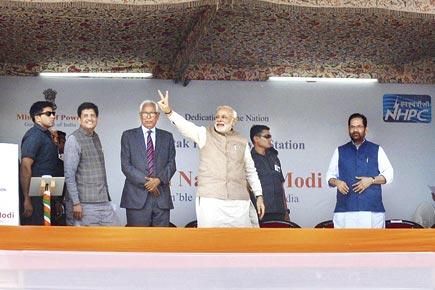
Batalik Sector Kargil: 1999
The sun had disappeared, dropping an impregnable black quilt over the terrain. It hid the crisp green of the grass, the blue rush of the sparkling water, the mesmerizing beauty of the district; and he preferred it that way.
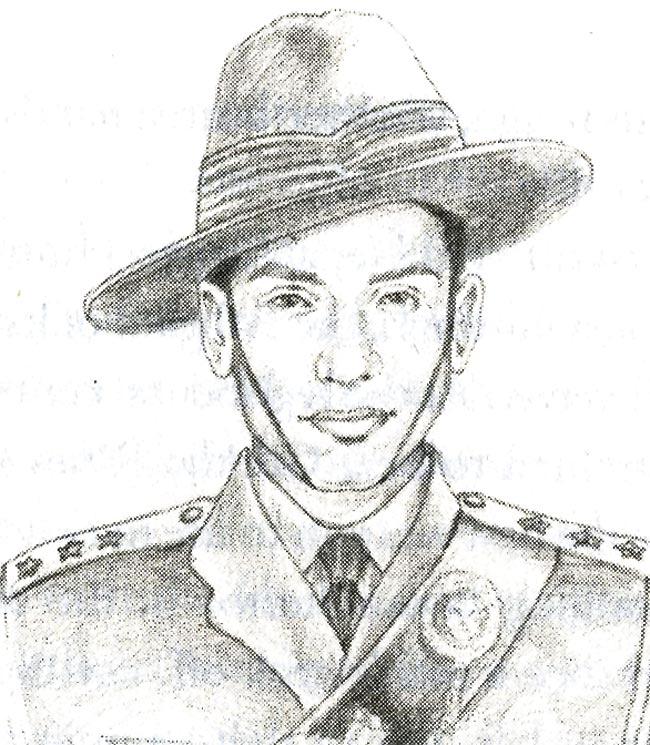
Manoj Pandey, a true Vir whose spirit lives on
Daylight just added to his outrage at Pakistan’s audacity to sneak in and occupy the heights around them. Emotion interfered with resolve; tonight all he needed was cold reason and an animal's instinct for survival.
Somewhere behind him, in the gloomy darkness intercepted only by the call of crickets, the Ganasak Nala gurgled, lapping against the quiet of the still night. Ahead loomed a steep though blurred 70-degree incline.
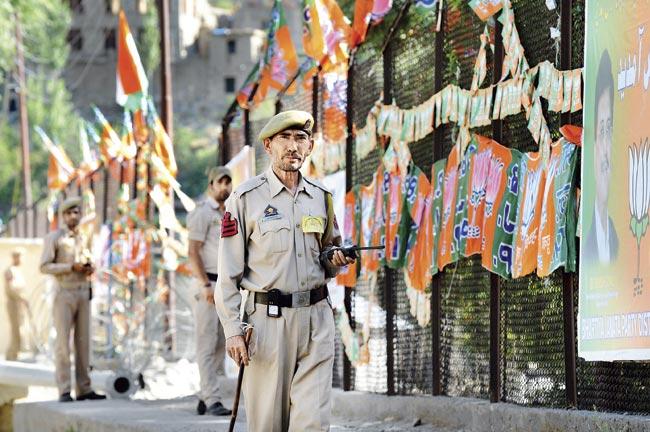
Policemen inspect the site of a public rally ahead of a visit by Narendra Modi in Kargil
That was Khalubar, the 5000-metre high ridge he and his men had to climb that night. Their task: to reach up undetected, take the enemy by surprise and destroy the Pakistani bunkers on top before daybreak.
Walking into a hail of bullets…
He knew not many of them were expected to return but that didn’t bother him much. He remembered the emotional words he had once scrawled in the depths of a diary he had been maintaining since childhood: Some goals are so worthy; it’s glorious even to fail. Signalling to his men to follow with a curt nod, Manoj got up, slung his gun behind him and started to walk.
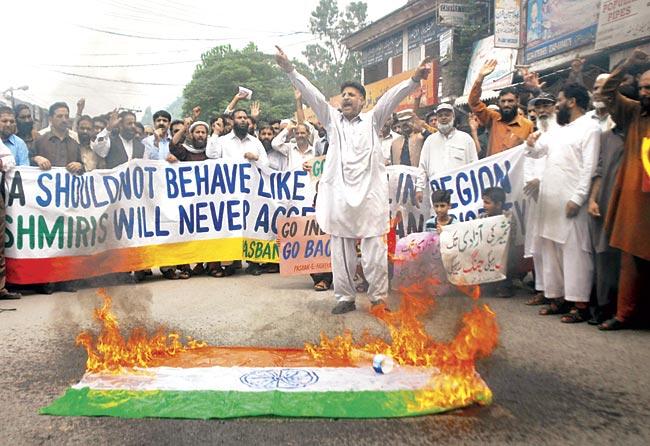
Kashmiri refugees chant slogans beside a burning an Indian flag during a protest against the visit of Narendra Modi to Kashmir as they strongly condemn his anti-Pakistan remarks, in Muzaffarabad, the capital of Pakistan-occupied Kashmir (PoK). Pics/AFP
For more than a month they had been on almost continuous assignments, one following the other. In the Army, they called it a rodent's life scampering up hillsides under cover of darkness, finding holes to crawl into when daylight broke, carrying on their backs 4-kg backpacks that held sleeping bags, extra pairs of socks, shaving kits and letters from home.
They would nibble on hard, stale puris when hunger struck. Though the nala was close, with its fresh water beckoning, they could never reach it because the enemy would fire from the top. Instead, they would reach into crevices to snap off icicles that they would suck greedily on to quench their thirst.
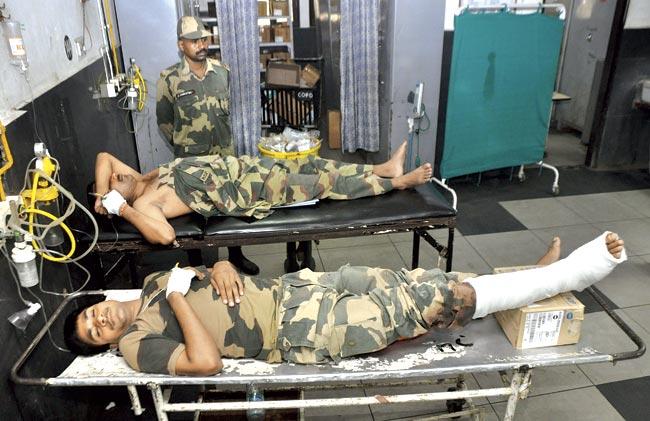
Border Security Force (BSF) soldiers injured in cross-border firing undergo treatment at a hospital in Jammu on August 11, 2014. India accused Pakistan of injuring four people during firing along their border in Kashmir, on the eve of Narendra Modi’s visit to the disputed region
They would fill their water bottles with crushed snow for the endless rocky climbs where water would not be found and crack icicles under their teeth, swirling them around in their mouths like the coloured iced lollies from their childhood.
Manoj and his men had been climbing in miserable darkness for almost nine hours. Most of them had rolled up their jackets and shoved them into their backpacks. Manoj had a pair of spare woollen socks that he had wrapped around the breechblock of his rifle to keep it warm and lubricated and protected against jamming in the cold.
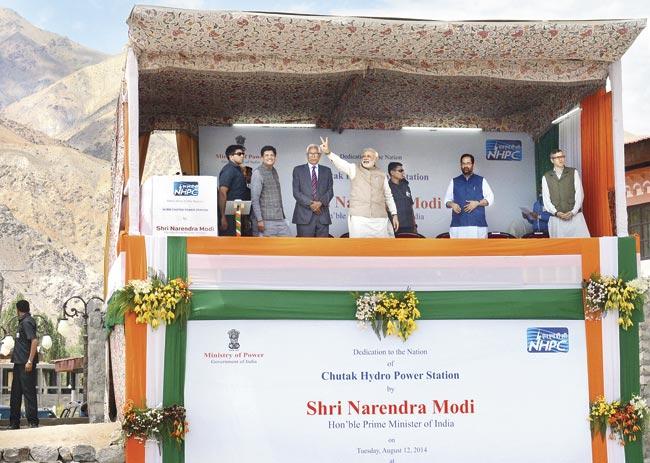
Narendra Modi (C) waves to the crowd on his arrival to Kargil. He is the first Indian Prime Minister in nine years to visit the 1999 war region. Pic/AFP
A seized weapon in war could make the difference between life and death. Though the night temperature was touching sub-zero, the arduous climb made the soldiers sweat. Manoj led his men, quick and noiseless. He would slip his fingers into cracks in the rocks and pull himself up, feeling his way ahead, deliberately keeping his mind off the fact that there could be a snake or a scorpion sitting in a crevice, ready to strike.
Climbing was a thirst-inducing business and most of the men had finished their one-litre water bottles. They found some patches of snow under larger stones. While some of it was fresh and could be picked up in greedy fistfuls to quench thirst, most of it was too contaminated by gunpowder to be of any use.
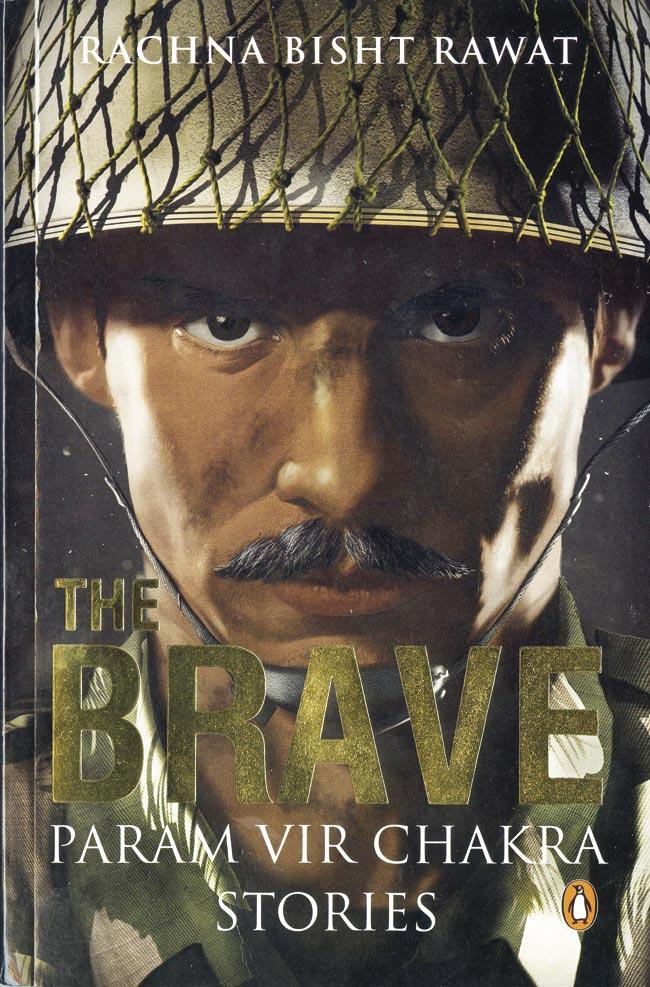 From: The Brave: Param Vir Chakra Stories
From: The Brave: Param Vir Chakra Stories
Author: Rachna Bisht Rawat
Publisher: Penguin Books India Price: Rs 250
Manoj ran his tongue over chapped lips and didn't reach for water even though he was tempted. There was just one last sip left. He wanted it there for psychological support till the end. The men had been climbing for more than fourteen hours.
They hadn’t slept for twenty-four. Sudden downpours of sleet and snow had left them chilled to the bone. They had miscalculated the treacherous path, lost their way twice in the dark and it was already morning by the time they spotted the hazy outline of the top.
They had the option to go back before the enemy spotted them but Manoj made up his mind they would complete the task they had been sent for. There would not be any turning back now. They would storm the enemy bunkers, making the best of the bad weather and the wet mist creeping up the cliff s, with its cold fingers on all it found in its path.
Another volley of fire lit up the sky. Manoj knew the guns were lined up on the highway, all along the Indus, firing at least 20,000 rounds at a time. The aim was to distract the enemy, which was why he and his men had been able to climb the 70-degree incline unnoticed do far. However, this time the fire seemed to be coming dangerously close. The burst of the shells was accompanied by a hail of bullets and suddenly a soldier screamed out in pain and collapsed.
Closer to the enemy...
‘Take cover,’ Manoj shouted, ‘this looks like enemy fire.’ The bullets, rockets and machinegun fire were coming at them with an unnerving accuracy. The cries of men who had been hit rang out through the stillness of the chilly morning.
From behind the boulder where he had taken cover, Manoj looked out. Around him was death and destruction. Limbs had been torn apart, flesh ripped into, and blood was seeping into the soil as the gut-wrenching screams of his men echoed in the impersonal stillness of the bare brown mountains.
He knew they would have to storm the enemy in a daring daylight attack, right now. As soon as his mind was made up, the rush of adrenaline overcame indecision, fear and nervousness. The paralysing cold seeping into his bones was replaced by the heat of blood coursing through his veins. As the tracer bullet came flying past, lighting the place with a deadly cocktail of shrapnel and fire, Manoj stood up, tall and brave, his slight frame coiled like a spring, his face a mask.
He roared at his men that were fit to fight, ordering them to follow him through the hail of bullets. Like a colossal god with invincible powers he walked into the curtain of shells and bullets. He didn't look back even once to see who had followed his final command but if he had he would have been a satisfied man.
All his Gorkha jawans who could pick themselves up and walk were right behind him, their khukris gripped firmly in their hands. Leaving behind those dead or dying, the men charged like angry lions, placing their feet firmly on the sleet-covered jagged rocks, following the man, who was not walking through flying bullets for the first time. They had seen him do it before. Just about a month ago.
The time is here...
The time has come to show that daring once again and Manoj does not disappoint his men. Adrenaline coursing through his veins, he gestures to them to follow and, steeling his heart against every instinct for self-preservation, walks into the curtain of flying bullets to reach the first bunker on the ridge a pile of cut rocks with a boulder for a roof, grainy in the brooding fog that is sweeping across the landscape.
He can make out the shadowy outlines of two Pakistani Northern Light Infantry soldiers. He is not conscious of an effort but a sharp tug at his belt apprises him that his hand has gripped the handle of the khukri hanging there and whipped it out in a silken move. The sheath falls away limply by his side as his hand fl ashes its ferocious blade up in the chilly wind.
The thumping of his heart is left behind in an instant as he runs across the uneven terrain, jumping over boulders in the falling snow, his face a grotesque mask of death, and falls upon the enemy soldiers, ferocious and proud. There is a swish in the air as the blade, cutting through the falling snowflakes, flashes and slices into human flesh.
Right to left, left to right. Then again. And again. The bodies of the shocked Pakistanis, terror written in their eyes, fall in a bloody pile. They could have never imagined that someone would walk in through the deadly fire. Had he been watching, the young officer's regimental centre khukri ustad would be proud of his student as he lets the blood drip off his khukri and looks up to find his next target.
Sprinting across to the second bunker, the men fiercely pounce upon the enemy and a bloody hand-to-hand combat follows, ‘Jai Mahakali, Aayo Gorkhali’ piercing the cold morning. Return shots ring out. Some of the enemy soldiers are charging with their bayonets, but most found they are no match for the gutsy Gorkhas with their lethal khukris that are splashing blood on the wet rocks. Suddenly, Manoj winces.
He has been hit in the shoulder by a bullet. Unconcerned, and feeling no pain in the heat of the moment, he takes out his gun and moves on to the next bunker, spraying the ones hiding there with a shower of bullets. Another bullet comes and hits him in the leg, making him stagger unsteadily.
‘Naa chodnu,’ (Don’t leave them) he cries out in Gorkhali, telling his men to carry on the carnage, and drags his injured leg forward. Reaching out for a grenade, he lobs it at the fourth bunker from where mortar fire is coming at them.
Even as an explosion rents the sky, throwing up a dull grey cloud of stone and debris, a fatal shot bursts through the air and hits the officer in the forehead. There is a flash of yellow and he is engulfed by the smell of burning cordite and a warmth in the freezing cold. His whole body is wracked by a terrible pain; his brain is on fire, his lungs gasping for breath, his heart seems to want to force itself out of his chest and his tongue is dry and swollen with thirst.
He wants to go on and shoot the Pakistani soldier he can see leaping out of the burning bunker and race down the slope, but his disobedient body had stopped listening to his commands. He can only watch as his arms let go of the rifle he has been holding, his fingers lose their grip on the trigger, his knees buckle under him and his neck slumps forward on his heaving chest. Blood courses down his face, blurring his vision.
There is a spurt of light in his head, then stark darkness and silence. Finally, he has to close his eyes. Manoj Kumar Pandey of 1/11 Gorkha Rifles is dead; his blood-stained body tilts in an arch and falls gently to the ground in front of the fourth bunker of Khalubar. He is 24 years and seven days old.
About six years ago...
On a warm, sultry summer afternoon, a thin boy with a side parting in his hair and shiny new leather shoes walked down for his service selection board interview for NDA.
He was trying to keep his mind off the bite in his toes, the sting of the cheap elastic in his socks and the guilt he had felt asking his poor father for money to buy them. He reminded himself that he was the best NCC cadet in his state and desperately hoped that his basic knowledge of English would not desert him during the interview.
‘Why do you want to join the Army?’ the interviewing officer was stern and abrupt, and looking straight into his eyes. ‘I want to win the Param Vir Chakra,’ he replied returning the stare, hoping the sentence was grammatically correct. The interviewing officer looked at the others on the board and exchanged a smile.
Sometimes, they say, there is magic in the air and we must be careful about what we say because it will come true. Not only did young Manoj Kumar Pandey from Sitapur district in Uttar Pradesh get into NDA, he also won the Param Vir Chakra, the Armed Forces’ highest gallantry award. Unfortunately, he hadn’t said he wanted to wear it live.
 Subscribe today by clicking the link and stay updated with the latest news!" Click here!
Subscribe today by clicking the link and stay updated with the latest news!" Click here!







